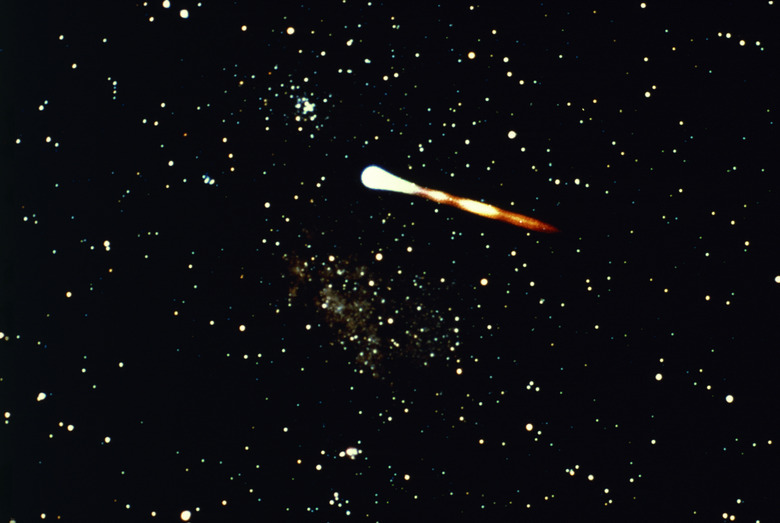Do Asteroids And Comets Rotate?
Scientists think it was an asteroid that crashed into Earth, causing the extinction of the dinosaurs. Comets have been more benign, and may have even delivered most of the water found our planet today. As relics of the creation of our solar system 4.6 billion years ago, comets and asteroids may be very different "space rocks" but they both rotate around themselves, just like Earth.
Rotation
Rotation
Asteroids and comets rotate, but not exactly like the Earth. Because Earth is a sphere, its mass is distributed relatively evenly, so it rotates smoothly. Asteroids and comets aren't uniformly shaped, so their rotation can be more of a tumble. NASA equates their rotation to the spin you see on a badly thrown football. The direction of rotation can differ for each individual asteroid or comet.
Asteroid Rotation Speed
Asteroid Rotation Speed
The fastest rotation scientists have recorded is that of Asteroid 2008 HJ. This asteroid is oblong and does a complete rotation every 42.7 seconds. It is able to turn so fast because it is only 12 meters by 24 meters (39.4 feet by 78.7 feet) — about the size of a tennis court. Other asteroids usually take between one hour and one day to rotate. There is more to be discovered about how fast asteroids rotate. In fact, scientists at Cornell recently discovered the force from light particles colliding with asteroids can make them rotate more quickly.
Comet Rotation Speed
Comet Rotation Speed
The nucleus of the comet Wirtanen has a period of 7.6 hours — in other words, it takes that long for one rotation. Hale-Bopp, a well-known comet, takes 11.47 hours to rotate, but the comet Phaethon spins around in only 3.6 hours. Other comets range from a few hours to 15, but usually spin more quickly than asteroids. Speeds of comets can be calculated by photometry, which measures the brightness of the comet as it turns. Scientists track the rotation of the nucleus of the comet, which is rock instead of the ice that surrounds it.
Importance
Importance
Passing by the gravitational fields of planets, such as Earth, can change the rotation or spin of asteroids. A change in rotation can affect the course of the asteroid, potentially bringing it closer to Earth. NASA monitors both comets and asteroids when they come within collision range, so understanding how they rotate is especially important. According to a paper in the "Annual Review of Earth and Planetary Sciences," there is still a lot about the rotation of comets, including direction, that scientists don't understand.
References
- NASA: Comets vs. Asteroids!
- USTA: 78 Foot Tennis
- NASA: Asteroids: Read More
- The Cornell Daily Sun: Profs Link Light to Asteroid Rotation Speed
- University of Tennessee: General Properties of Asteroids
- University of Hawaii: General Comet Rotation Characteristics
- University of California Los Angeles: Cometary Rotation: An Overview
- Encyclopedia Britannica: Photometry
- NASA: Full Nucleus Rotation of Comet Hale-Bopp
- Voice of America: Asteroid's Spin Intrigues Astronomers
Cite This Article
MLA
MacGregor, Kelly. "Do Asteroids And Comets Rotate?" sciencing.com, https://www.sciencing.com/asteroids-comets-rotate-20105/. 24 April 2017.
APA
MacGregor, Kelly. (2017, April 24). Do Asteroids And Comets Rotate?. sciencing.com. Retrieved from https://www.sciencing.com/asteroids-comets-rotate-20105/
Chicago
MacGregor, Kelly. Do Asteroids And Comets Rotate? last modified March 24, 2022. https://www.sciencing.com/asteroids-comets-rotate-20105/
